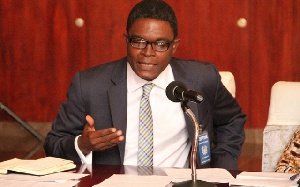Government has been urged to urgently educate the public to clear the confusion on the difference between the direct election of Metropolitan, Municipal and District Assembly (MMDCEs) and multi-party elections of MMDCEs.
At a press interaction in Accra organised by the Institute of Democratic Governance (IDEG), panellists suggested to the government to explain the on-going processes, mobilise citizens’ participation in and support the successful implementation of the recent decision to transform the local government by enabling MMDCEs to be elected on party card.
The panellist commended the President for strategic and courageous decision on the amendment of Article 55(3) by 2019 and called on all stakeholders to support the effective and timely implementation of the momentous decision in both parliaments and the national referendum.
Dr Emmanuel Akwetey, IDEG Executive Director said the amendment of the article would strengthen democratic stability, developmental governance and accelerates transformational and inclusive local economic development.
He explained that the amendment would help create enabling political, legal, financial and decentralized environment which would allow independent political parties to effectively function as developmental parties but not marginalized election and business machines in post-elections eras.
“For 30 years or more, political parties have been excluded from participating in local government have deprived them of the political, organizational, administrative and technical competencies needed to effectively steer accelerated local economic and social development,” he added.
Touching on other expected results, he said, “The national referendum on the amendment would be deemed to have been approved by the majority, if a minimum of 40 per cent of the registered voters’ turnout in the referendum and 75 per cent voted in favour of the amendment, support of the implementation of the President’s decision on the amendment,” he said.
“IDEG reckons that the turnout could be massive if civil society organizations and the political parties work together in mobilizing popular support for the referendum.
“We think that the Parliamentary process of amending the Constitution in 2018 will be completed in time,” he said.
Mr Kwesi Jonah, a senior research fellow at IDEG said the institution had been monitoring the debate on whether holding multiparty local government elections in 2021, rather than in 2019, which defines the 24 months the NPP pledged to get MMDCES elected, was evidence that the President and the NPP had failed to deliver on their promise.
“We have found the debate interesting but also too election-centric and narrow. We believe that unless the general public is made to understand the broader vision and strategic nature of the President’s decision, successful implementation of the decision to amend the article will be frustrated,” he said.
General News of Friday, 11 May 2018
Source: ghananewsagency.org













